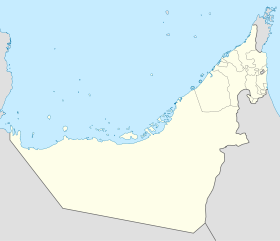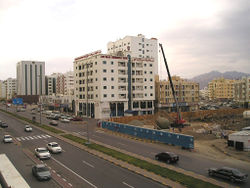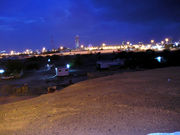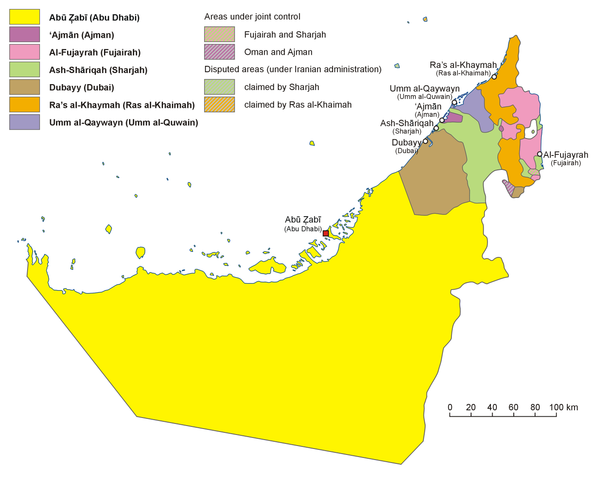Fujairah
| Al Fujairah الفجيرة |
|||
|---|---|---|---|
| — emirate — | |||
| Emirate of Fujairah | |||
|
|||
 Al Fujairah
|
|||
| Coordinates: | |||
| Emirate | Fujairah | ||
| Government | |||
| - Emir | His Highness Sheikh Hamad bin Mohammed Al Sharqi | ||
| - Crown Prince | His Highness Sheikh Mohammed bin Hamad bin Mohammed Al Sharqi | ||
| Population (2006) | |||
| - Density | 1,150/km2 (2,978.5/sq mi) | ||
| - Metro | 130,000 | ||
| Time zone | UAE standard time (UTC+4) | ||
| Website | Fujairah | ||
Fujairah (Arabic: الفجيرة, al-fuǧayrah) is one of the seven emirates that make up the United Arab Emirates, and the only one on the Gulf of Oman in the country's east instead of Persian Gulf (the other six emirates).
Contents |
History
In 1902, Fujairah accepted a British protectorate, becoming the last of the emirates to join the Trucial States.
On 2 December 1971, Fujairah joined the United Arab Emirates.
Geography
The Emirate of Fujairah covers 1,150 km2 (440 sq mi), or about 1.5% of the area of the UAE, and is the fifth largest Emirate in the UAE. Its population is around 130,000 inhabitants. Only the Emirate of Umm al-Quwain has fewer occupants.
Fujairah is the only Emirate of the UAE that is almost totally mountainous. All the other Emirates, like Dubai and Abu Dhabi are located on the west coast, and are largely covered by desert. Consequently, Fujairah boasts a higher than average yearly rainfall of the UAE, allowing farmers in the region to produce one crop every year.
The weather is seasonal, although it is warm for most of the year. The months of October to March are generally regarded as the coolest, with daytime temperatures averaging around 25 °C (77 °F) and rarely venturing above 30 °C (86 °F)—with temperatures climbing to over 40 °C (104 °F) degrees in the summer. The winter period also coincides with the rainy season and although by no means guaranteed, this is when Fujairah experiences the bulk of its precipitation. Rainfall is higher than the rest of the UAE. partly because of the effect of the mountains that encircle the Emirate, and partly because the prevailing winds are easterly bringing with them water-laden clouds off the warm Indian Ocean.
The variability of the east coast climate is partly due to the presence of the Hajjar mountain range. As with other mountainous areas, precipitation is higher, and this allows for a more varied micro-environment in the area. Tourist visitor numbers peak just before the school summer months.
Government
Power is ultimately held by the ruler of Fujairah, His Highness Sheikh Hamad bin Mohammed Al Sharqi, who has been in power since the death of his father in 1974. The Sheikh supposedly makes money himself through his own business, and the government funds are used for social housing development and beautifying the city, although there is little distinction between the state and his personal wealth. The ruler can make any decisions regarding any aspect of law, although federal laws are never repealed.
The Sheikh and his immediate family heads the cabinet of Fujairah, and a few members of respected local families make up the advisory committees. The Sheikh must ratify any decisions by the cabinet. After the ratification, such decisions may be enacted into law as Emiri decrees, which are usually effective immediately.
Land
Foreigners or visitors are not allowed to buy land. Emirati nationals can purchase land from the government, after proving their nationality. If there is no suitable land available via the official government offices, private purchases can also be made, with the eventual price being determined by the market and the individuals themselves.
Economy
Fujairah's economy is based on subsidies and federal government grants distributed by the government of Abu Dhabi (the seat of power in the UAE). Local industry consists of cement, stone crushing and mining. A resurgence in the construction activity helped the local industry. There is a flourishing free trade zone,[1] mimicking the success of the Dubai Free Zone Authority[2] which was established around Jebel Ali Port.

The federal government employs the majority of the native, local workforce, with few opening businesses of their own. Many of the locals work in the service sector. The Fujairah government prohibits foreigners from owning more than 49% of any business. The free zones have flourished, partly due to the relaxation of such prohibition within the zones, as full foreign ownership is allowed there. Shaikh Saleh Al Sharqi, younger brother to the ruler, is widely recognized as the driving force behind the commercialization of the economy.
Developments

The ruler is planning to make changes that will affect Fujairah. Among tourism projects in the pipeline is an $817m resort, Al Fujairah Paradise, near Dibba Al-Fujairah, on the northern Omani border, next to Le Meridien Al Aqah Beach Resort. There will be around 1,000 five-star villas as well as hotels, and it is expected that all the construction work will be finished within two years.
The Sheikh is trying to improve opportunities for the local workforce, by trying to entice businesses to locate in Fujairah and diverting Federal funds to local companies in the form of development projects.
The Habshan–Fujairah oil pipeline has been announced which will create an oil export terminal in the Emirate.[3]
Health care
Health care is delivered in a mixed public and private system. Locals are treated free at the federal government hospitals, while foreigners have to pay for medical care. The national government funds the federal hospitals and subsidize health care with petrodollar revenues. There are criticisms that the government is not providing health care sufficiently for those with low income, who have to pay for critical treatment themselves.
The Fujairah government has built clinics, known locally as "medical houses", such Madena Medical House in Madab, and Moresheed Medical House in Moresheed. These clinics complement and help lighten the load on the main Fujairah Hospital by allowing walk-in appointments and providing ancillary medical services. These clinics turned out to be a success, visited by the local populace.
The chief of surgery and emergency medicine, Dr. S. C. Gautam, is recognized as the protagonist behind the modernization of health care within Fujairah. As the standards of surgical and emergency care improve in the country, Dr. Gautam became the director of the Advanced Trauma Life Support program, which helped introduce a measure to improve emergency treatment and survival rates amongst the thousands of trauma patients admitted across the country every year.
GMC Hospital is a private health care provider in Fujairah. It contains an emergency department, operating theater, pharmacy and outpatients clinics. It is located near the Ahli Club.
Education
There are many government schools in Fujairah, which are mainly for Emirati people, beside some numbers of Arab residents. Aside from government schools, there are also private schools, and due to the majority of the population of the Emirate hailing from the Indian subcontinent, most of the private schools follow the Indian Central Board of Secondary Education (CBSE) syllabus, accredited by the Central Education Board of India.
- Indian School Fujairah
- Our Own English High School
- St. Mary's Catholic High School
Three schools also provide the UK General Certificate of Secondary Education (GCSE) syllabus. These schools are aimed at students of the expatriate community who subsequently intend to study in other countries.
- Fujairah Private Academy, also provides International General Certificate of Secondary Education (IGCSE), A level, AS Level
Fujairah Private Academy, subjectively the top school in Fujairah, is a fee paying school for boys and girls from 3.5 to 18 years of age. There are 400+ pupils, with 120 in the Senior Section.
- Our Own English High School
- St. Mary's Catholic High School, also provides General Certificate of Education (GCE) A levels
A few other schools serving other expatriate communities also exist, such as Iranian and Pakistani schools, educating a minority of the student population.
Our Own English High School, Fujairah, caters to the needs of expatriates from many countries including the subcontinent. The school follows the CBSE, New Delhi, India and the IGCSE (University of Cambridge, UK) from Kindergarten to Grade 11/12. It is part of the larger Varkey Group, which owns and runs schools around the U.A.E.
Pakistan Islamia School Fujairah (PISF) U.A.E. was established in 1982 with less than 35 students and classes in wooden cabins. The school has since then grown substantially and is now, with over 402 students and its own school purpose built-building, one of the leading Pakistani Community Schools in the UAE.
Fujairah Montessori Nursery is the only pre-school in Fujairah. It admits children from the age of two years. It is located at building number 14 in the "16 Buildings".
Travel
Travel in and around Fujairah and the surrounding towns of Khor Kalba, Khor Fakkan, Kalba and Masafi has been made easy by the development of modern highways over the last 30 years, since gaining independence in 1971. Highways are funded by the federal government directly, and contracts are tendered centrally. This is meant to safeguard the quality and delivery of the contracts and prevent corruption from damaging the construction. Highways are vital due to the unavailability of any other means of transport. There are some buses in Fujairah but not for travel; they are for schools, colleges and some companies or they come from other cities. There are no railways yet in Fujairah, though in 2008 a railway network connecting all the Persian Gulf states was planned.[4] The car and the truck are the main mode of transport. Most daily activities can become impractical, if not impossible, without a private vehicle.
Newcomers and tourists can use the taxi system, which operates all day and night. There is no central booking system for private companies, but the government is planning to apply one. Taxis are hailed by standing at the roadside and flagging one down. Fares within the city are fixed at AED 4 per journey, which equates to one dollar and nine cents(USD) or 50 pence (GBP). Destinations which are slightly outside the main city, such as the Beach Motel, Fujairah Hospital and the Jail attract a higher fare of 6 AED.
As of 2007 All taxis are metered. Uniformed in color (Mostly Yellow with green stripes) and report to a head company known as Cars. The meter starts from a minimum of 2 AED. A ride cost an average of 6 AED. [5]
The Fujairah International Airport is near the city, with a large falcon statue at the airport roundabout.

Daily life
On some Fridays, one can still witness lashes meted out for minor offences, such as being drunk in public, and the transgressors lashed depending on how serious their crime was. Punishments are delivered outside the main court, located next to Fujairah Tower, in the centre of the city. However such practice have become uncommon in recent years.
Drinking alcohol is allowed at designated hotels, and as of 2000, at a few bars. Until 1998, gambling in the form of slot machines was allowed in certain hotels, but personal petitions by locals to the Sheikh outlawed the activity. It transpired that some players were losing entire monthly wages on the slots, leaving nothing for the upkeep of their families.
Fujairah is one of the safest cities in the UAE. Cinemas are generally open till late and de-sexualised versions of the Hollywood blockbusters are shown. However, the Hindi cinemas are not constrained by the censors because they are not as raunchy as some Hollywood productions.
Groups of (Emirati) youths tend to socialize together on the streets and cafés or outside games arcades, cinemas and mini malls. It is unusual to see mixed gendered groups as the Emirati society is quite segregated.
On vacations occasionally, many Fujairah residents travel to Eastern emirates such as Dubai and Abu Dhabi for entertainment and shopping purposes. Or they might visit Wadis surrounding the emirate on camping and hiking trips. While other Emirates residents visit Fujairah for relaxation purposes and to get away from the stifling heat of the desert. Watersports is becoming more and more popular amongst both locals and tourists. Example of Watersports are jet skiing, Wind Surfing, Water Ski and Diving. Professional Diving Instructors can be found in Le Meridien, where one can even obtain an International Diving license for a fee.
Flag

From 1902 until 1952, the flag of Fujairah was plain red. In 1952, the Sheikh included the name of the emirate, in white, on the red flag. This continued to be the official flag until Sheikh Hamad bin Mohammed Al Sharqi abolished the red flag and adopted, instead, the Federal flag for Fujairah.
See also
- List of rulers of separate Emirates of the United Arab Emirates
- Creative City
References
- ↑ Fujairah Free Zone
- ↑ Jafza Jebel Free Zone
- ↑ "CORRECTED - Sumitomo, Salzgitter, Jindal win UAE pipeline deal". Reuters. 2008-01-02. http://www.reuters.com/article/rbssIndustryMaterialsUtilitiesNews/idUSL3145105720080102. Retrieved 2008-01-02.
- ↑ Railway Gazette International January 2009 p21 with map
- ↑ to get new taxi fleet
External links
- Fujairah travel guide from Wikitravel
- Fujairah Tourism Bureau
- Fujairah EU Portal
- Fujairah Municipality
- Fujairah Police
- Fujairah Higher Colleges - About Fujairah
|
|||||||

